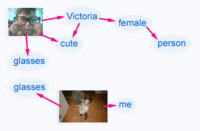| Friday, February 4, 2005 |
| The Six Laws of the New Software |
| As a programmer I'd of course like to write something great and new and useful. But the problem is, as Dror Eyal says in
The Six Laws of New Software: You're too late! Most home consumers have all the software they will ever need, and most companies out there already have all the basic technologies they need to successfully compete. Hm, yeah. But not exactly encouraging. So, what are those six laws? SINGLE IDEA: The best way to succeed in the marketplace is to create software that fulfills a specific need. This may seem like an obvious point at first, but if you can not explain to the end user what the software does in a single sentence it is probably too complex. Your first task is to ask yourself, “What does my product do?” He elaborates the detail on each one. Well, excellent advice. Do something clear and simple and useful. Make it obvious to use. Make it work with existing standards and other programs. And don't think about it for very long. Put it out there right now. Yep. [ Programming | 2005-02-04 15:14 | 7 comments | PermaLink ] More > |
| Tagwebs, Flickr, and the Human Brain |
 Jakob Lodwick has an epiphany on tagging and Flickr and how the human brain works. OK, I'm not sure it really says anything new, but he explains, for dummies, what it is to tag your pictures, and why that's a really good thing, which just might tweak greater intelligence out of the net. Jakob Lodwick has an epiphany on tagging and Flickr and how the human brain works. OK, I'm not sure it really says anything new, but he explains, for dummies, what it is to tag your pictures, and why that's a really good thing, which just might tweak greater intelligence out of the net.
Tagging is basically just that you can assign a category or keyword of some kind to some piece of data, like a picture. That is an example of metadata. That is, it isn't the thing itself, but it is something you say about it. Or which somebody else comes along later and says about it. And the cool thing is that if that is done in a reasonably standard way, all sorts of software and search engines can come along later and show a lot of previously hard-to-find connections, and they can group things together for you that have similar tags. That would be the Semantic Web. I.e. that instead of just a bunch of free-form text and pictures on millions of webpages, we tag things in more finegrained detail as to what it is. This is a name, this is a country, this is a movie, this is a quote, etc. If that was done with all the data on the net, amazing new things will be possible. But the trouble is that it is a lot of work, and not really much fun, to go over existing texts and add a lot of tags saying what it is. And then the trouble is how we agree on what the proper category structure is. If you call it "city" and I call it "town" and French people call it "ville", how can we group it together well enough. Those are hard problems that aren't sufficiently solved. In part because human language is fuzzy, and we all have different mind maps of how things should be organized ina perfect world. So, the semantic web hasn't really happened, and any examples of it tend to be kind of pathetic and not really useful. So, the tag thing, even though it is the same idea, sort of relaxes the tension and opens it up for instant use. I.e. you don't worry about the perfect ontology of categories. You just tag thing you care about, with whatever tags make sense for you. And smart programs come along later and try to make useful applications based on the tags they find. Hm, I've gotta make some of those. [ Knowledge | 2005-02-04 16:15 | 8 comments | PermaLink ] More > |